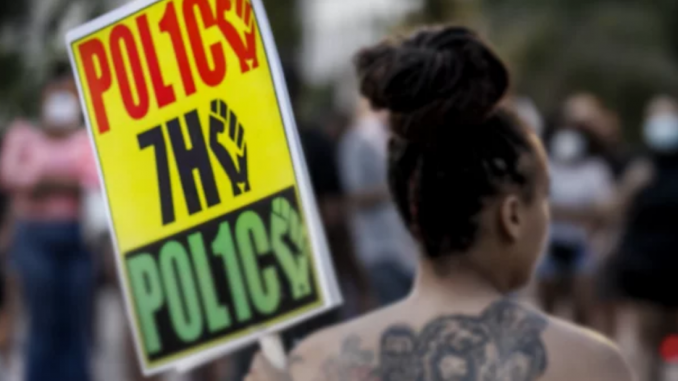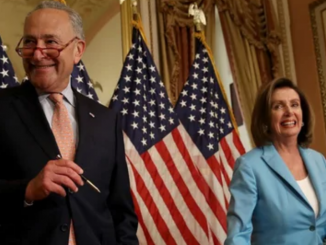
Police officers across the country have been fired, demoted or otherwise disciplined for social media posts that voice opposition to Black Lives Matter and violence during racial justice protests.
In recent weeks, two policewomen in New Jersey were fired or demoted for calling BLM protesters “terrorists,” and a police officer in Virginia was canned for criticizing political leaders who side with racial justice rioters.
Sara Erwin was a police officer in Hopewell Township, New Jersey, when she sounded off on Facebook last year about racial justice riots. She said her children were in tears, begging her not to go to work for fear she would be killed.
In the post, she denounced the tactics of Black Lives Matter and asked people supporting the movement to unfriend her.
“Just to let you know — they are terrorists,” she wrote in June 2020. “They hate me. They hate my uniform. They don’t care if I die.”
Several fellow Hopewell officers liked Ms. Erwin’s post or offered some support. One of them was Sgt. Mandy Gray, who had recently been promoted.
It prompted an internal department investigation. The police brass took no action, but the Township Committee voted unanimously on April 30 to fire Ms. Erwin. Ms. Gray was demoted and suspended for six months.
Those are not isolated incidents. Police officers have been punished in Virginia, Idaho and Georgia for criticizing a movement that they see as anti-police.
In response, police have filed lawsuits claiming their free speech rights are being trampled.“There is a balance that has to be struck given there may be a community or a department interest in not having everyone speak for or represent the department,” said Randy Petersen, a law enforcement analyst at the Texas Public Policy Foundation. “But in the politically fraught moment we’re in right now, I think people have not been fired in what the public would consider a lot more egregious cases.”
Another law enforcement officer recently took heat for his online response to basketball great LeBron James’ tweet about a Columbus, Ohio, policeman who fatally shot a knife-wielding teenage girl involved in a street fight.
“You’re next,” Mr. James said in a since-deleted tweet over a photo of a police officer with his face blurred. “#Accountability.”
Nate Silvester, a deputy with the Bellevue, Idaho, Marshal’s Office, made a TikTok video in which he pretended to have a conversation with Mr. James and urged a fictitious Black attacker off camera to stop stabbing another Black victim.“So you don’t care if a Black person kills another Black person, but you do care if a White cop kills a Black person, even if he’s doing it to save the life of another Black person?” Mr. Silvester asks in the video, in which his department affiliation is not shown.
He was suspended for a week.
In Norfolk, Virginia, police Lt. William Kelly anonymously donated $25 to the defense fund for Kyle Rittenhouse, who stands accused of murder and attempted murder after shooting people during rioting last year in Kenosha, Wisconsin.Mr. Rittenhouse, who at the time was 17 and armed with an AR-15-style rifle, said he was defending himself when he fatally shot two people during several clashes with mobs in the street.
Mr. Kelly used his city email address when he donated and included the message that “the rank and file” were behind Mr. Rittenhouse and his claim of self-defense.“Don’t be discouraged by the political class of law enforcement leadership,” Mr. Kelly wrote, without identifying himself or his department.
After what the police union in Norfolk labeled a cursory investigation, Mr. Kelly was fired. He has since sued the city.
Mr. Kelly declined to be interviewed for this report.
All of these cases point to an easy solution, said Kevin Boshea, a former prosecutor turned defense attorney in New Orleans who has worked extensively with police officers.
“They shouldn’t do any of it,” Mr. Boshea said. “You shouldn’t have police officers sounding off on social media on political issues because there’s no way you can say some of it is protected by the First Amendment and some aren’t. You can’t be splitting hairs like that.
“If you take one big example, I don’t think cops should be out saying they support BLM or that they don’t like BLM as an agency,” he said. “A police officer has to represent and protect everyone in the community, and how are you going to be able to do that effectively if you’re a cop in New Orleans or another majority-black city if you’re posting anti-Black Lives Matter stuff?”
Mr. Boshea’s relative absolutism has the elegance of Alexander slicing the Gordian knot, but it would mean officers’ rights are suborned to the department’s public relations.
As Mr. Kelly’s comments showed, the real problem may lie in the different attitudes of many cops on the beat compared with the officers behind the desks.
“Every single cop knows another cop he doesn’t want speaking for the department,” said Mr. Petersen. “It’s a common sentiment that the rank and file don’t share the views of police leadership, which in big cities is almost always a liberal person. That doesn’t mean all of law enforcement supports it.”
That has public safety departments’ top brass trying to balance between protecting the rights of officers and the perception of the department.
“It’s a fragile line, to say the least, especially in these fraught times,” said Jack Rinchich the national president of the National Association of Chiefs of Police. “Police officers feel they have a right to freedom of speech, but not everyone has the same tact. If something impacts the image of the agency, I can see where the chief might have some questions.”
Of course, those questions become more knotted when there is a perception they are enforced only one way. In the most recent examples, all of the officers took what might be dubbed a conservative or pro-police viewpoint and were harshly disciplined.The Hopewell Township officers say they fell under that double standard.
“What everyone needs to understand and recognize is that the political body that terminated Sara Erwin and suspended and demoted Mandy Gray is comprised solely of Democrats,” said the officers’ attorney, Frank Crivelli. “Unfortunately, the comment made by Sara and the support provided by Mandy did not fit their agenda and was unpopular amongst a vocal group of people that share the committee’s views. As a result, and because it is ‘popular’ and perhaps ‘vogue’ within the Democratic Party to disenfranchise and treat our law enforcement officers like second-class citizens, the committee has clearly jumped the bandwagon in handing out the draconian punishments they have.”
In some cases, officers’ ordeals from speaking out on social media have proved a boon. Mr. Silvester may “NOT represent the Bellevue Marshal’s Office,” as stated in a press release, but he has signed a book deal.
Curt Varone, a New England lawyer and firefighter who runs the Fire Law Blog, said a careful line can be drawn between allowing some freedom of speech and protecting the agencies’ perceptions and reputations.
“The two categories where we see people getting into trouble are if someone is suggesting violence or harm is OK when it is brought about against certain people, and when there is a suggestion of withholding service based on certain categories of individuals,” Mr. Varone said.He cited the example of cops or firefighters hinting on social media that they approved of running over protesters blocking highways or other important traffic arteries.
In Johns Creek, Georgia, police Chief Chris Byers resigned in August after posting on Facebook that he did not support the Black Lives Matter movement. In Detroit, some public safety employees posted photos of George Floyd with his rap sheet “suggesting he wasn’t an angel,” Mr. Varone said.
The idea of a double standard on political grounds remains unsettled, he said.In 2018, a White firefighting captain in Columbia, South Carolina, resigned after he made Facebook posts criticizing Black Lives Matter protesters. The firefighter, Jimmy Morris, sued on the grounds that his First Amendment rights had been violated and that different context would not have resulted in discipline.
The court threw out his First Amendment case, but Mr. Morris reached a settlement with city officials on the double standard argument in his lawsuit.“Context does matter,” Mr. Varone said.
*story by The Washington Times


